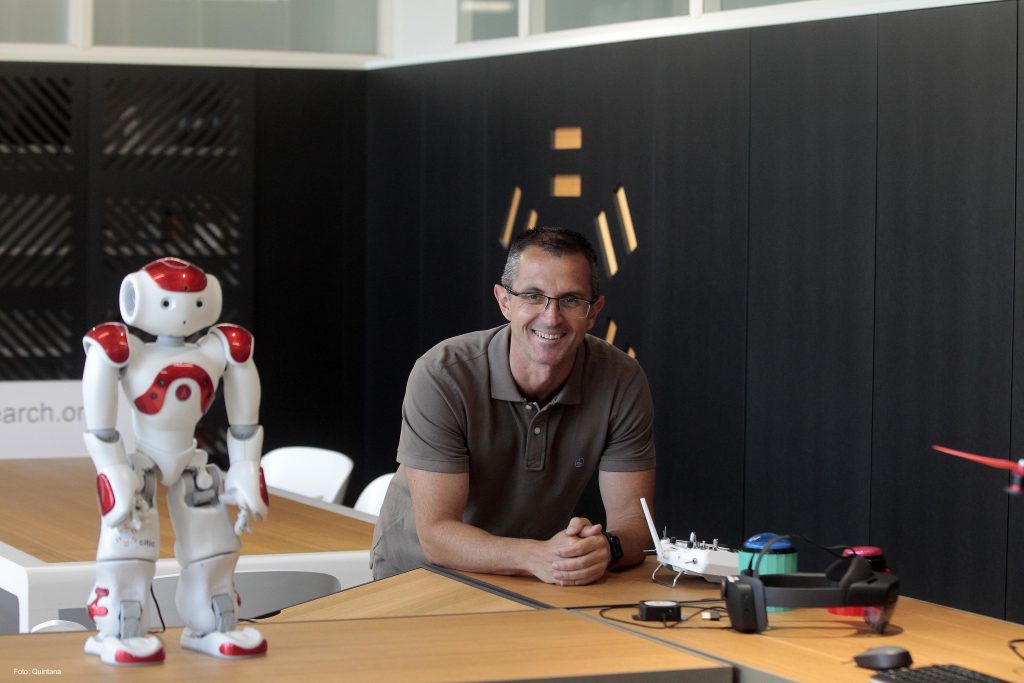
A report led by Francisco Bellas shows that AI in education must include personalized explanations to be reliable
Foto cedida por Quintana.
- Francisco Bellas, a researcher at CITIC (Research Center for Information and Communication Technologies) of the University of A Coruña (UDC), has led a European study highlighting the need for AI tools used in education to provide explanations for their responses, and for these explanations to be tailored to the specific needs of students and education professionals.
- The explainability of AI is a crucial issue for promoting critical thinking and the reliability of these tools.
A Coruña, May 15, 2025. – As part of its ongoing commitment to advancing digital education, the team led by researcher Francisco Bellas at CITIC (Research Center for Information and Communication Technologies) of the UDC has played a key role in the development of a pioneering report on Explainable Artificial Intelligence (XAI) in education. This initiative is part of a joint effort spearheaded by the European Digital Education Hub (EDEH), in collaboration with international experts from various educational sectors.
The report, the result of the work of EDEH’s working group number 13, focuses on three fundamental aspects of XAI: legal implications, personalization, and AI literacy. These topics are addressed in a practical way, through the analysis of real cases and clear recommendations for the implementation of XAI in education.
The project began in August 2024, when Bellas was invited to lead the team after participating in a previous EDEH project on AI in education. This new initiative focused on AI explainability, a key topic to ensure that technological tools are understandable and accessible to both educators and students.
The report explores in depth the legal aspects related to the use of AI in the education sector, paying particular attention to the AI Act and the General Data Protection Regulation (GDPR), both essential frameworks for ensuring ethical and lawful implementation of these technologies. In addition, it emphasizes the importance of personalizing the explanations provided by AI tools to suit the specific needs of students, educators, or management teams, ensuring that each individual receives the appropriate support to understand the responses.
The report also underscores the urgency of developing digital skills related to AI. “AI literacy is essential not only for educators but also for students, who must be able to understand the decisions made by AI systems and act independently and responsibly in their learning process,” says CITIC researcher Francisco Bellas.
Webinar on XAI in Education
The report is currently available to the public (through this LinkedIn post for now, and in a few weeks on the official website of the European Commission’s publications service) and is expected to serve as a valuable resource for the educational community interested in AI. As part of this initiative, CITIC at the UDC invites all interested parties to join the webinar to be held on May 20. This event will offer an opportunity to explore the topics covered in the report in greater depth and to foster discussion on how AI can be implemented ethically and effectively in education.
Interested participants can register for the event via the following link: EUSurvey – Survey.
About CITIC
CITIC is a research center that fosters progress and excellence in R&D&I applied to ICT. It was founded in 2008 by the University of A Coruña. The center’s scientific activity is structured around four main research areas: Artificial Intelligence; Data Science and Engineering; High Performance Computing; and Intelligent Services and Networks, as well as a cross-cutting research area: Cybersecurity.
CITIC is accredited as a Center of Excellence and a member of the CIGUS Network for the 2024–2027 period. The center’s accreditation, structuring, and development are co-funded by the Xunta de Galicia and 60% by the European Union under the ERDF Galicia 2021–2027 Operational Programme, with the thematic objective of promoting “a smarter Europe through innovative and smart economic transformation” (ED431G 2023/01).





